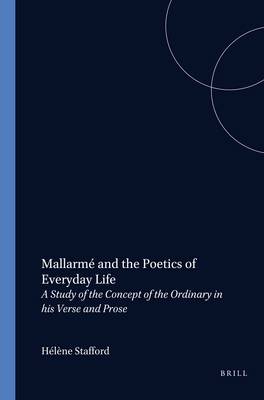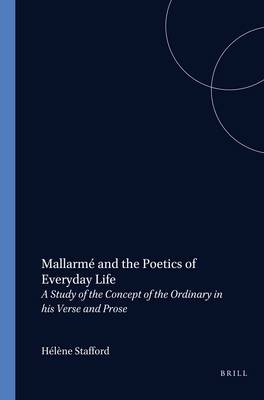
- Afhalen na 1 uur in een winkel met voorraad
- Gratis thuislevering in België vanaf € 30
- Ruim aanbod met 7 miljoen producten
- Afhalen na 1 uur in een winkel met voorraad
- Gratis thuislevering in België vanaf € 30
- Ruim aanbod met 7 miljoen producten
Zoeken
Mallarmé and the Poetics of Everyday Life
A Study of the Concept of the Ordinary in His Verse and Prose
Hélène Stafford
€ 123,95
+ 247 punten
Omschrijving
This book is concerned with the relocation of the concept of the ordinary within the works of Stéphane Mallarmé (1842-98). It engages with much of Mallarmé's oeuvre, concentrating on the textual features which reveal that, even in his most difficult texts, the ordinary as conceptual tool, as textual matter and as contemporary environment is never dismissed, but re-invented and invested with new and lively meaning. The instability of the concept in the texts, its qualities which range from the threatening to the immensely fertile make it a particularly rewarding area of study, against the background of a critical corpus which has in the past seen Mallarmé's work at best as unconcerned with ordinary life, at worst as irremediably removed from it. Here is presented for the first time a study of a metalanguage which appears surprisingly frequently in the Mallarmé corpus. The complex metaphorisation of the banal in Mallarmé's oeuvre, as well as the ideological discourse of the journalistic writings in their engagement with contemporary life are analysed and contribute to the demonstration of the existence within the corpus of an idealised ordinary world re-invented by the poet.
Specificaties
Betrokkenen
- Auteur(s):
- Uitgeverij:
Inhoud
- Aantal bladzijden:
- 244
- Taal:
- Engels
- Reeks:
- Reeksnummer:
- nr. 198
Eigenschappen
- Productcode (EAN):
- 9789042013148
- Verschijningsdatum:
- 1/01/2000
- Uitvoering:
- Paperback
- Formaat:
- Trade paperback (VS)
- Afmetingen:
- 150 mm x 220 mm
- Gewicht:
- 412 g

Alleen bij Standaard Boekhandel
+ 247 punten op je klantenkaart van Standaard Boekhandel
Beoordelingen
We publiceren alleen reviews die voldoen aan de voorwaarden voor reviews. Bekijk onze voorwaarden voor reviews.








